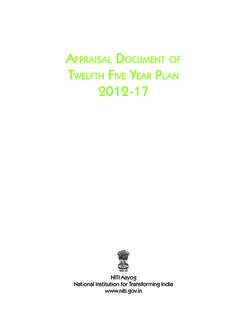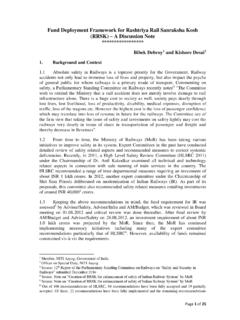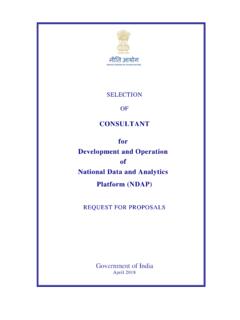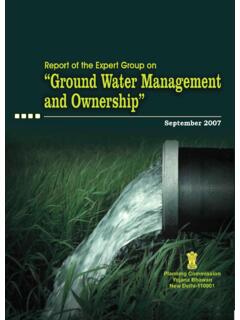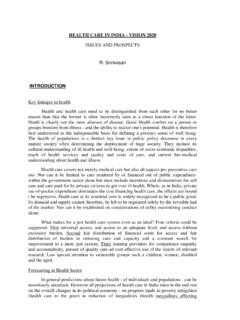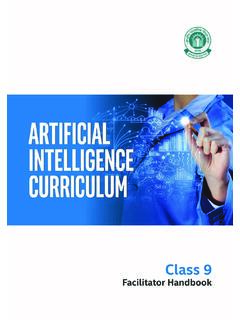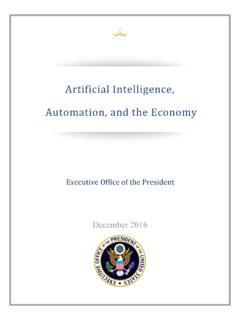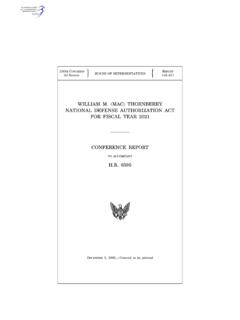Transcription of Approach Document for India - NITI Aayog
1 Approach Document for IndiaPart 1 Principles for Responsible AIFEBRUARY 2021 RESPONSIBLE AI#AIFORALLF ebruary 2021In writing this report; Towards Responsible AI for All, Rohit Satish and Tanay Mahindru from NITI Aayog have made valuable contributions. We are pleased to have collaborated with the World Economic Forum Centre for the Fourth Industrial Revolution as the Knowledge partner in developing the Responsible AI for All Approach Document . The valuable contributions of Ms. Kay Firth Butterfield and Ms. Arunima Sarkar from World Economic Forum is acknowledged. Legal inputs enabled by Microsoft is also are also grateful for the support and contributions of several experts from India and globally including Prof Amit Sethi, Prof Balaraman Ravindran, Prof Gary Marchant, Google, Mr John Havens and Srichandra (IEEE), Prof Mayank Vatsa, Dr Shefalika Goenka and her team at PHFI, Dr P Anandan and Dr Rahul Panicker from Wadhwani Institute for artificial intelligence , Dr Rohini Srivatsa, and Vidhi Center for Legal Policy.
2 Valuable inputs were also provided by various Ministries/ Departments of the Government of India and regulatory institutions, namely MeitY, DST, DBT, PSA s Office, RBI and RoyAdvisor,NITI AayogAcknowledgementsFebruary, 2021 New Delhi,IndiaDr. Rajiv KumarVice ChairmanNational Institution for Transforming India Government of IndiaNew Delhi, IndiaThe economic potential of deployment of artificial intelligence has been widely highlighted by policy makers, technologists, academics and civil society around the world. In India , the National strategy on artificial intelligence (NSAI) released by NITI Aayog in 2018 highlights the potential of AI to solve social challenges faced by its citizens in areas such agriculture, health and education , in addition to the pure economic returns that are brought by this 2018, the deployment of AI in India has only grown, through the support of enthusiastic state governments, research institutions, leading applications from the private sector and a vibrant evolving AI start-up ecosystem.
3 Though AI is often deployed with intentions of improving access and quality and higher efficiency and solving pressing problems, risks and challenges of leveraging AI have also emerged across a number of different areas. AI is a technology that continues to advance rapidly and the discourse on AI ethics and governance is also evolving. Globally, a number of different sets of AI ethics principles have been put forward by multilateral organizations, private sector entities and various nation states. For India , these principles are grounded in the fundamental rights afforded to citizens by the Constitution. Apart from establishment of principles however, it is also necessary for India to frame means of implementing the principles across the public sector, private sector and academia in a manner that balances innovation and governance of potential further on the National strategy on AI, this Approach paper, the first part of the strategy titled Towards Responsible AI for All , aims to establish broad ethics principles for design, development and deployment of AI in India drawing on similar global initiatives but grounded in the Indian legal and regulatory context.
4 The second part of the strategy which will be released shortly explores means of operationalization of principles across the public sector, private sector and academia. Within this framework, it is hoped that AI can flourish, benefitting humanity while mitigating the risks and is inclusive bringing the benefits of AI to all. The paper incorporates insights, feedback and experiences consolidated through inter - ministerial consultations, large-scale global multi-stakeholder consultations and a series of 1-1 consultations with AI ethics experts in India and globally, as well as wider public consultations, conducted over the last 15 months. This paper is meant to serve as an essential roadmap for the AI ecosystem, encouraging adoption of AI in a responsible manner in India and building public trust in the use of this technology, placing the idea of AI for All at its very core.
5 Dr. Rajiv KumarFOREWORDF ebruary, 2021 New Delhi,IndiaDr. Rajiv KumarVice ChairmanNational Institution for Transforming India Government of IndiaNew Delhi, IndiaThe economic potential of deployment of artificial intelligence has been widely highlighted by policy makers, technologists, academics and civil society around the world. In India , the National strategy on artificial intelligence (NSAI) released by NITI Aayog in 2018 highlights the potential of AI to solve social challenges faced by its citizens in areas such agriculture, health and education , in addition to the pure economic returns that are brought by this 2018, the deployment of AI in India has only grown, through the support of enthusiastic state governments, research institutions, leading applications from the private sector and a vibrant evolving AI start-up ecosystem.
6 Though AI is often deployed with intentions of improving access and quality and higher efficiency and solving pressing problems, risks and challenges of leveraging AI have also emerged across a number of different areas. AI is a technology that continues to advance rapidly and the discourse on AI ethics and governance is also evolving. Globally, a number of different sets of AI ethics principles have been put forward by multilateral organizations, private sector entities and various nation states. For India , these principles are grounded in the fundamental rights afforded to citizens by the Constitution. Apart from establishment of principles however, it is also necessary for India to frame means of implementing the principles across the public sector, private sector and academia in a manner that balances innovation and governance of potential further on the National strategy on AI, this Approach paper, the first part of the strategy titled Towards Responsible AI for All , aims to establish broad ethics principles for design, development and deployment of AI in India drawing on similar global initiatives but grounded in the Indian legal and regulatory context.
7 The second part of the strategy which will be released shortly explores means of operationalization of principles across the public sector, private sector and academia. Within this framework, it is hoped that AI can flourish, benefitting humanity while mitigating the risks and is inclusive bringing the benefits of AI to all. The paper incorporates insights, feedback and experiences consolidated through inter - ministerial consultations, large-scale global multi-stakeholder consultations and a series of 1-1 consultations with AI ethics experts in India and globally, as well as wider public consultations, conducted over the last 15 months. This paper is meant to serve as an essential roadmap for the AI ecosystem, encouraging adoption of AI in a responsible manner in India and building public trust in the use of this technology, placing the idea of AI for All at its very core.
8 Dr. Rajiv KumarFOREWORDI ntroduction 011. The Need for Responsible AI 05 Exploring the Ethical Considerations 10 Systems Considerations 11 Systems Consideration 1: Understanding the AI system s functioning for safe and reliable deployment 12 Systems Consideration 2: Post-deployment can the relevant stakeholders of the AI system understand why a specific decision was made? 13 Systems Consideration 3: Consistency across stakeholders 15 Systems Consideration 4: Incorrect decisions leading to exclusion from access to services or benefits 16 Systems Consideration 5: Accountability of AI decisions 18 Systems Consideration 6: Privacy risks 21 Systems Consideration 7: Security risks 23 Societal Considerations 262.
9 Legal and Regulatory Approaches for Managing AI Systems 283. Technology Based Approach for Managing AI Systems 334. Principles for Responsible Management of AI Systems 37 Appendix 43 1. Self-Assessment Guide for AI Usage 44 2. Review of Global Regulatory Landscape 50 3. Model Transparency Mechanisms 53 Contents1 Introduction2 NITI Aayog released the National strategy for artificial intelligence (NSAI) discussion paper in June 2018, in pursuance of the mandate entrusted to it by the Hon ble Finance Minister in the Budget Speech of 2018 2019. NSAI while highlighting the potential of artificial intelligence (AI) for accelerating growth also emphasised the social potential of large scale adoption of AI with a focus on themes of inclusivity, adopting the theme of AI for All.
10 Towards promoting development as well as adoption of AI, the NSAI made broad recommendations for supporting and nurturing an AI ecosystem in India under four heads, (a) promotion of research; (b) skilling and reskilling of the workforce; (c) facilitating the adoption of AI solutions; and (d) the development of guidelines for responsible AI . While underlining the role of private sector and collaboration, NSAI identified key focus sectors where the Government was expected to play the lead, viz. health, education , agriculture, smart cities and recommended establishment of clear mechanisms to ensure that the technology is used in a responsible manner by instilling trust in their functioning as a critical enabling factor for large scale adoption in a manner that harnesses the best that the technology has to offer while protecting citizens.
